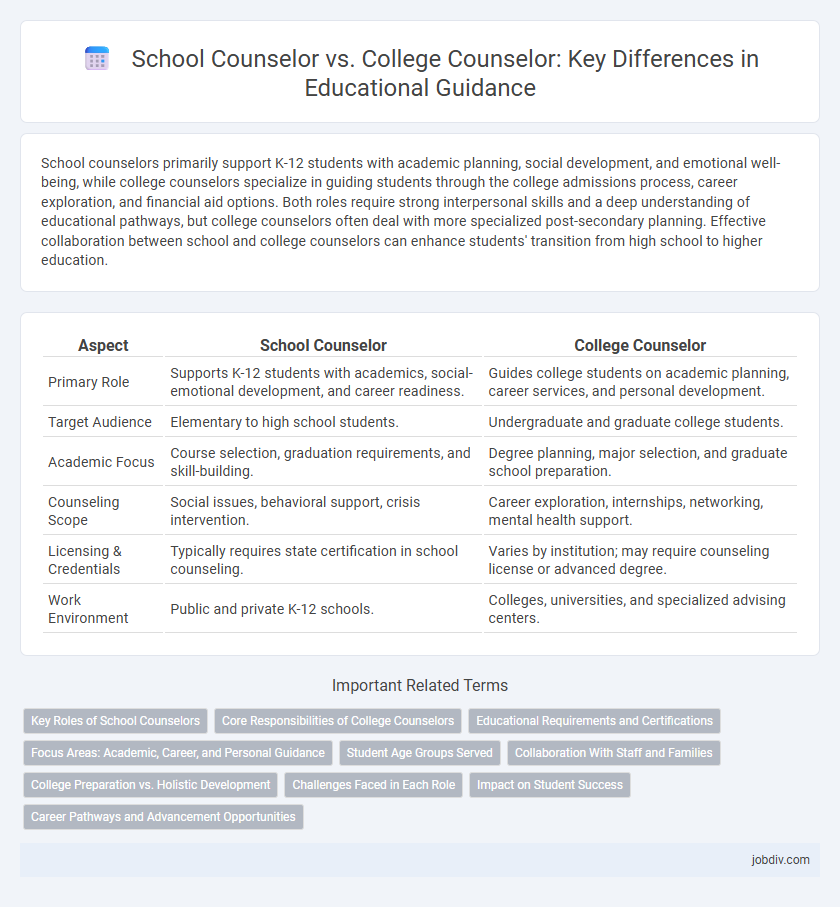School counselors primarily support K-12 students with academic planning, social development, and emotional well-being, while college counselors specialize in guiding students through the college admissions process, career exploration, and financial aid options. Both roles require strong interpersonal skills and a deep understanding of educational pathways, but college counselors often deal with more specialized post-secondary planning. Effective collaboration between school and college counselors can enhance students' transition from high school to higher education.
Table of Comparison
| Aspect | School Counselor | College Counselor |
|---|---|---|
| Primary Role | Supports K-12 students with academics, social-emotional development, and career readiness. | Guides college students on academic planning, career services, and personal development. |
| Target Audience | Elementary to high school students. | Undergraduate and graduate college students. |
| Academic Focus | Course selection, graduation requirements, and skill-building. | Degree planning, major selection, and graduate school preparation. |
| Counseling Scope | Social issues, behavioral support, crisis intervention. | Career exploration, internships, networking, mental health support. |
| Licensing & Credentials | Typically requires state certification in school counseling. | Varies by institution; may require counseling license or advanced degree. |
| Work Environment | Public and private K-12 schools. | Colleges, universities, and specialized advising centers. |
Key Roles of School Counselors
School counselors primarily focus on supporting K-12 students' academic achievement, social-emotional development, and career readiness through individualized guidance and intervention strategies. They collaborate with teachers, parents, and administrators to create a safe and inclusive learning environment, addressing issues such as bullying, mental health, and college preparation. Unlike college counselors who assist with college admissions and financial aid, school counselors provide comprehensive support tailored to the developmental needs of younger students within the school system.
Core Responsibilities of College Counselors
College counselors primarily guide students through the college application process, including selecting suitable institutions, preparing application materials, and securing financial aid. They provide personalized support for career planning, standardized test preparation, and navigating admission deadlines. Unlike school counselors, college counselors focus extensively on higher education transitions and post-secondary academic success.
Educational Requirements and Certifications
School counselors typically require a master's degree in school counseling or a related field, along with state certification or licensure specific to K-12 education. College counselors often hold advanced degrees in counseling, psychology, or higher education, with certifications such as the Certified College Counselor (CCC) credential enhancing their professional qualifications. Both roles demand specialized training in student development, but school counselors focus primarily on academic and social support within primary and secondary schools, while college counselors address career planning, enrollment processes, and higher education guidance.
Focus Areas: Academic, Career, and Personal Guidance
School counselors primarily focus on academic support, social development, and emotional well-being of K-12 students, emphasizing study skills, classroom behavior, and peer relationships. College counselors concentrate on academic advising, career planning, and personal growth for post-secondary students, guiding them through major selection, internship opportunities, and mental health resources. Both roles prioritize personal guidance but differ in the complexity and scope suited to educational levels.
Student Age Groups Served
School counselors primarily support students in elementary, middle, and high schools, typically ranging from ages 5 to 18, focusing on academic guidance, social development, and emotional well-being. College counselors serve students aged 18 and older, addressing issues related to post-secondary academic planning, career exploration, and mental health challenges unique to young adults. The distinct student age groups served require counselors to tailor their strategies to developmental stages and educational transitions.
Collaboration With Staff and Families
School counselors collaborate closely with teachers, administrators, and families to support students' academic and social-emotional development within the K-12 environment. College counselors work alongside academic advisors, faculty, and families to guide students through college applications, career planning, and transition strategies. Both roles emphasize communication and partnership with staff and families to ensure student success at different educational stages.
College Preparation vs. Holistic Development
School counselors primarily focus on academic planning, college application guidance, and standardized test preparation, targeting college readiness for high school students. College counselors emphasize holistic development by addressing personal growth, career exploration, mental health, and social skills to support students' overall success. Both roles are essential in fostering student achievement but differ in scope, with school counselors concentrating on college preparation and college counselors promoting broader developmental goals.
Challenges Faced in Each Role
School counselors often face challenges balancing academic guidance with addressing students' social-emotional issues, managing large caseloads that hinder personalized support. College counselors encounter pressures related to career advising and mental health crises among diverse student populations, requiring specialized knowledge in higher education systems. Both roles demand strong communication skills and adaptability to effectively support students' developmental needs across different educational stages.
Impact on Student Success
School counselors play a critical role in fostering academic achievement and social-emotional development by providing early intervention and support within K-12 settings. College counselors primarily facilitate successful college admissions, career planning, and adjustment to higher education challenges, directly influencing students' post-secondary success. Both types of counselors contribute significantly to student success by addressing different developmental needs and guiding personalized goal-setting.
Career Pathways and Advancement Opportunities
School counselors primarily support students in K-12 settings by providing academic guidance, social-emotional support, and initial career exploration, often requiring a master's degree in school counseling and state certification. College counselors focus on higher education students, offering specialized career advising, internship placement, and postgraduate planning, usually holding degrees in counseling, psychology, or related fields with licensure options for advanced practice. Career advancement for school counselors can lead to administrative roles such as director of guidance, while college counselors may progress to positions like career services director or higher education administrator.
School Counselor vs College Counselor Infographic

 jobdiv.com
jobdiv.com